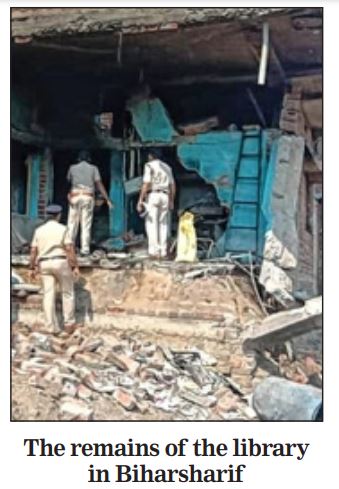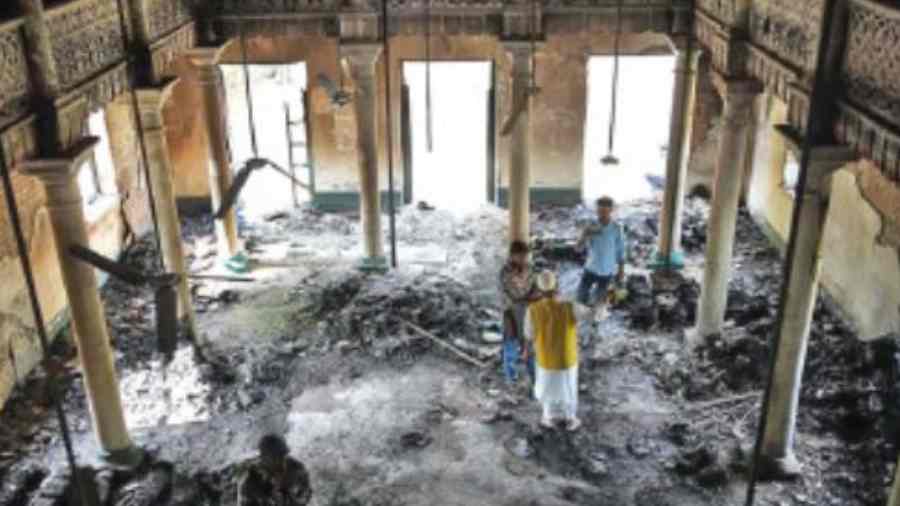Nightmares about books crackling in the flames haunt Muhammad Shakir, principal of the Madrasa Azizia in Biharsharif, every night.
He has not been reading up on the book burnings by the Nazis in 1930s Germany and Austria.
His nightmares are about what he saw 25 days ago — when rioters burnt the books at the madrasa’s 113-year-old library.
A rampaging mob had stormed the library on March 31 during the communal violence that followed the Ram Navami processions in Biharsharif town, located in chief minister Nitish Kumar’s home district of Nalanda. BBC News reported the incident on Sunday.
The books smouldered for four days.
“The books here were society’s collective treasure. There were around 4,500 of them, including about 250 rare books. There were handwritten ones on Unani medicine, and books on philosophy and history in Persian, Arabic and Urdu,” Shakir told The Telegraph.
“I would have been happier had they killed me and spared the library.”
What hurts him most is that the centuries-old, rare books — which had enriched students, teachers, researchers and ordinary readers down the generations — are lost forever to posterity. They had not been copied, photographed or digitised.
Luckily, the 500-odd students of the residential madrasa — who study from Class I to Fazil (equivalent to a postgraduate course) at the school building on the same compound as the library — were away as the month-long Ramazan holidays had already started.
Most of the employees were away, too, since it was a Friday. A few who were present hid themselves to escape the mob.
The BBC report said that according to local people, the rioters “were armed with sticks, stones and petrol bombs and allegedly shouted provocative slogans near the madrasa before attacking it”.
“Suddenly I could smell smoke,” the report quoted Abdul Gaffar, a cook at the madrasa, as saying. “When I opened the door, I saw there was a lot of chaos near the office. They (the mob) had moved towards the hostel as well. I got scared and hid under the bed.”
The police have accused Bajrang Dal members of the violence that brought the town, around 70km southeast of Patna, to a standstill for around nine days. Some 150 people, including the Bajrang Dal’s Nalanda district convener, Kundan Kumar, have been arrested.
In the 1930s, the German Student Union had carried out a campaign of burning books it considered subversive or ideologically opposed to Nazism. The books targeted included those written by Jewish authors — among them, Albert Einstein — as well as communists, socialists, anarchists, liberals, pacifists and others.
“When I first saw the (library) blaze, I felt like I had lost everything. We used to discuss how much knowledge the books contained, particularly the rare ones,” Shakir said.
Several madrasa employees, including Shakir, spent Ramazan and Id-ul-Fitr trying to clean the beautifully latticed building, its pillars and walls now covered in soot, and its electricity and water supply disrupted at a time the mercury has been soaring to 44 degrees Celsius.
“All the electrical wires, fittings and furniture too are burnt. The submersible motor that pumps up water is still there, but we can’t operate it without power. We are somehow managing to work (cleaning the building) in the scorching heat without electricity,” Shakir said.
But cleaning the building isn’t the same as restoring it.
“Our estimates suggest that restoration will cost around Rs 3 crore, not to speak of the invaluable books we have lost,” Shakir said.
He said he had petitioned Nalanda district magistrate Shashank Shubankar, the sub-divisional officer, the circle officer and social welfare department officials seeking help to restore the building.
“I attached a copy of the FIR that we have registered and photographs of the fire with the petition. But nobody has offered or promised anything so far,” Shakir said on Monday.
“We are now thinking of submitting a memorandum to the chief minister and education minister for help.”
The Nalanda district magistrate did not respond to a call to his mobile.
Bihar State Madrasa Education Board chairman Abdus Salam Ansari told this newspaper on Tuesday that he and his officials were trying to help the madrasa and library get back on their feet again.
“We went to see the place. It has been destroyed. The principal there has sought some books from us. We will provide them with textbooks from Classes I to XII,” Ansari said.
“We shall take the matter up at our next board meeting and discuss possible ways to help the madrasa and library further. We are also in touch with the education and minority welfare departments because renovating the burnt building will require a lot of money, time and expertise.”
The Bihar State Minorities Commission’s public relations officer, Farooquzzaman, said the National Commission for Minorities had sought a report on the burning of the library.
“Their letter came to us last week. We have written to the Nalanda district magistrate and sought a report from him. We may visit the place, if necessary,” Farooquzzaman said.
Nalanda superintendent of police Ashok Mishra said: “We are recording the statements of victims and eyewitnesses, and taking further action. Arrests are still going on. We have arrested around 148 people (for the overall Biharsharif violence) while several have surrendered in court.”
A woman named Bibi Soghara had built Madrasa Azizia in memory of her late husband, Abdul Aziz, in 1896. The library came up a few years later.
The madrasa was first started in Patna but was later shifted to Biharsharif, which was the Pala dynasty’s seat of power over a millennium ago and became famous for its Sufi saints in subsequent centuries.













